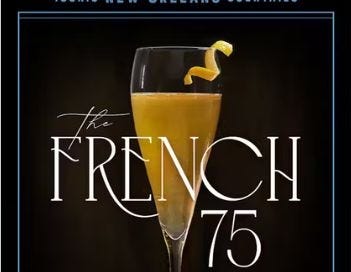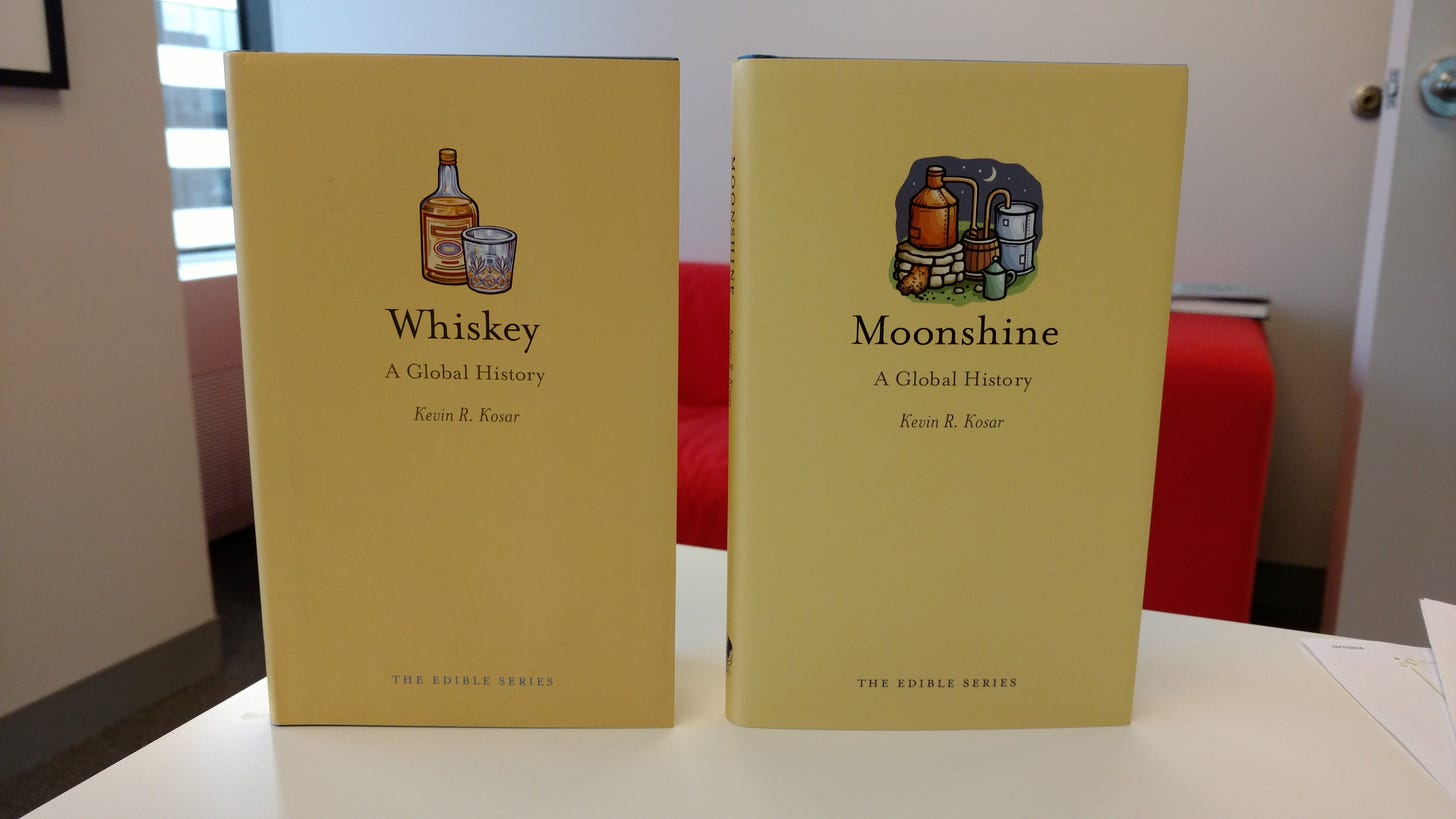So, what exactly is a French 75 cocktail?
"Fixing a date for the first French 75 is like fixing a date for the first lover’s kiss"
Readers of this newsletter likely know that I review books for the buzzy, punchy Washington Free Beacon, which is heavily read by conservatives and media folks. Recently, I wrote about John Maxwell Hamilton’s new, quick-reading book, The French 75 Cocktail.
It’s a fun book about a very popular cocktail with an exceedingly confused history. I certainly enjoyed writing about the book, and the Beacon graciously allows me to reprint it below.
"History is bunk," according to Henry Ford. But there is an irony to that quotation—the motor industries patriarch and presidential candidate did not say it. No, when asked about his views on foreign affairs in 1916 the isolationist plutocrat grumbled:
What do we care about what they did 500 or 1,000 years ago? I don't know whether Napoleon did or did not try to get across and I don't care. It means nothing to me. History is more or less bunk. It's tradition. We don't want tradition. We want to live in the present and the only history that is worth a tinker's dam is the history we make today.
That is a quite different sentiment, one that does not question whether historians can competently describe the past. Rather, Ford’s grouse simply questions whether there is any value in learning history.
Which brings me to John Maxwell Hamilton’s trim volume. It illuminates a too-little-heralded value of the historian’s craft: dispelling myths.
The French 75 cocktail has become a staple at swanky bars over the past few decades. Some menus proclaim its components to be 1 ounce of gin, 1/2 ounce simple syrup, 1/2 ounce of lemon juice, 2 ounces of Champagne, and a twist of lemon. Other bars eschew gin and use cognac or calvados, a French apple brandy, as the base spirit. And this is to say nothing of the mixologists who are tossing crème de pêche or elderflower liqueur into the mix.
So who is right, and who created this cocktail when?
It is hard to say. "Fixing a date for the first French 75 is like fixing a date for the first lover’s kiss," quips Hamilton. "Certainly, Frenchwomen and Frenchmen sipped Champagne-and-brandy precursors to the French 75. The brandy could have been Calvados, Armagnac, or Cognac." And it is entirely possible the French picked up the basic recipe from the British. Edward Belcher, an admiral in the Royal Navy, wrote in 1872, "Captain Bening made us a Champagne cocktail. Half a tumbler of Champagne, a little brandy, a little bitters, [and] a little sugar." (Sacré bleu!)
The earliest reference to the drink was a December 2, 1915, Washington Herald column. O.O. McIntyre wrote, "There has been brought back to Broadway from the front by War Correspondent E. Alexander Powell the Soixante-Quinze cocktail—the French seventy-five. It is one-third gin, one-third grenadine, one-third applejack and a dash of lemon juice." The drink’s name honored France’s 75-millimeter artillery gun, which they hoped would repel the invading Germans.
Here it is worth pausing to note that this earliest recipe had no Champagne in it. It was a boozy fruit bomb: piney gin sweetened up with a pomegranate syrup and a fruit brandy made by freezing hard apple cider to remove water and jack up the alcohol content. Its tripartite recipe distantly resembles the earliest Martini, which had gin, sweet vermouth, and dry vermouth. Like its cannon namesake, the original drink packed a wallop.
So how did a boozy concoction from a century ago become an "it drink" in the 21st century?
Partly, the drink, or at least the concept of the drink, became popular through its association with the defense of the homeland. Millions of French citizens wore Journee Du 75 medals featuring the cannon, a mechanical marvel of its time that could fire a couple dozen shells per minute to terrifying and devastating effect. Powell, who was quite friendly with the French government, helped promote the mighty field gun, writing of it in his dispatches and in his 1915 book, Vive la France! The French 75 gun became a pop sensation, extolled in song and featured on postcards.
The drink went along for the ride. "The 75 cannon and the 75 cocktail were a symbiotic duo," Hamilton writes. "The drink propagandized the war; the war advertised the cocktail." Myths cropped up around it, like the claim that soldiers chugged the potent potion before going into battle. Bars in France and the United Kingdom put it on their menus to show solidarity for the Allied cause.
As with any popular thing, rivals began staking claims to being the inventor or at least to knowing who the inventor was. Fine establishments in France, the United Kingdom, and even the United States began advertising that they were making the original recipe, which they disagreed upon. Bars like Harry’s New York Bar, the Savoy, and Arnaud’s made the French 75 part of their brand, while differing on its components.
Bar man Harry MacElhone added to the confusion and the drink’s reputation when he published his recipe book, Harry’s ABC’s of Mixing Cocktails in 1922. He credited Pat McGarry of London’s Buck’s Club with inventing the French 75 by modifying a Tom Collins (gin, lemon juice, sugar, and club soda) by swapping bubbly for club soda. It was called French 75, MacElhone proclaimed, because of the Champagne in it.
None of this is accurate, but that did not stop its untold readers over the ensuing decades from repeating that McGarry invented the drink and that it was made with Champagne. MacElhone later declared that absinthe was a component in the drink.
Shrouded in heroic lore, the French 75 endured and then got new life in the 1990s with the classic cocktail revival that erupted in England and New York. The great old drinks (Martinis, Manhattan’s, Sidecars, etc.) and techniques were rediscovered and propagated, and the new generations were introduced to the French 75 and its contending origin stories and formulations.
Which brings me back to Ford. Had he bothered to care more about history he might have not ended up peddling bogus theories about cabals of Jews based on old rumors. Ford also might have not wasted time stumping for the League of Nations, which never had a chance of restraining the timeless competition of countries for power and domination.
In short, even when good history cannot explicate the whole truth of the past it can discourage us from believing bunk and pursuing follies. We should all drink to that.






